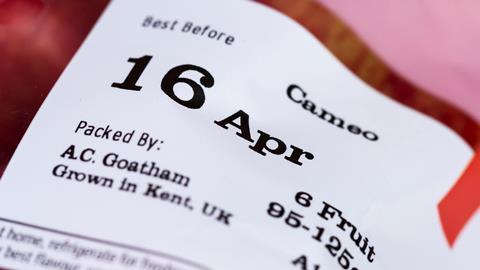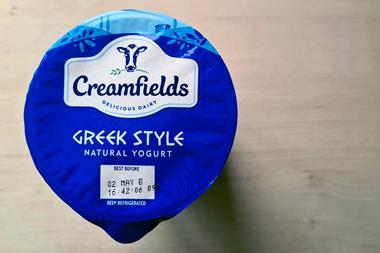Date ditching could cut food waste – but it’s not without its risks
Tesco did so in 2018. Lidl has never applied them. But in the last month Aldi, Sainsbury’s, Co-op, Asda, Waitrose, Morrisons and M&S have removed best before dates from swathes of product lines.
So what took these stragglers so long? Why now? And are there any drawbacks?
Consumer-facing ‘sell by’ dates were introduced by Marks & Spencer in 1972, and even boasted about in TV adverts starring Twiggy. But in the years since, date-marked food has been targeted by campaigners as a cause of food waste, as shoppers are influenced by the displayed date when choosing, regardless of condition.
In a February Wrap study, about 10% claimed to use dates ‘entirely’ or ‘mostly’ to make decisions on fresh produce. “If this minority were to base their decisions on the level of deterioration of the item, rather than the best before date, around 50,000 tonnes of food waste could be prevented each year”, the report states.
Dates are a strong psychological nudge, a separate WRAP study suggests. When shown an image of foods way past their best before date, the number of people that chose ‘dispose’ for an item significantly increased when a Best Before date was used, compared with when no date was displayed.
“Given the climate crisis and economic pressures we are experiencing, anything we can do to help consumers use their own judgement and make the most of the food they buy and waste less is imperative,” Catherine David, Wrap’s director of collaboration and change, tells The Grocer.
Date ditching can help supermarkets reach their own environmental targets, specifically their Scope 3 emissions – which includes waste created at household level – and could become mandatory to report publicly.
Besides, there is no requirement for retailers or producers to display a best before date, which relates only to quality, not safety, unlike use-by dates.
The FSA takes a firm line on use-by dates, even warning that milk past its use-by date “should never be sniffed”. But for best before, “sensory cues” like looking for mould and feeling for staleness will suffice.
“We are also clear that businesses must make sure the right date label is applied to their products, and only when needed, to ensure that food is safe and to help people make informed choices,” explains Robin May, chief scientific adviser at the FSA.
Sainsbury’s has dropped the dates on more than 1,500 lines (like other supermarkets, replacing them with a code for staff to use); Asda 250; Waitrose 500; and M&S more than 300.
But WRAP wants all supermarkets to go further, and see “more retailers removing Best Before dates from more fresh produce”.
“We applaud those retailers taking action, but there is a need, and opportunity, to go even further and ensure that no good food ends up in the bin,” David says.
New technology promises to further accelerate the demise of dated food too.
Ex-Iceland MD Nigel Broadhurst’s Oli Tec has a label that changes colour based on time and the temperature a product has been stored at, which it says “could be revolutionary in the reduction of food waste – both in the home and in-store”. It is first targeting meat suppliers for large scale trials.
“A lot of people see that date as read. If you took away that date – and used the label, The label is mirroring the actual condition of the product,” says CEO Nik Richardson.
“Current use-by and best-before systems do not work,” he adds. “They are not reactive and have no relevance to the period of opening, and storage conditions thereafter.”
There are some losers as dates are dropped. Now produce can be sold for longer, there’s less for redistribution charities.
The food they collect is already “lopsided” towards less fresh and healthy items, says René Meijer, CEO of surplus food upcycling social enterprise Food Works Sheffield. “The changes mean we pick up even less whole produce, so it’s even more lopsided, so there are short-term challenges,” he adds.
But Meijer is nevertheless supportive of the changes, given Food Works is chiefly an environmental organisation. “Redistribution is a plaster, not a solution for preventing climate change,” he says.
Risks
And there are risks. While Waitrose wants “customers to use their own judgement to decide whether a product is good to eat or not” and Sainsbury’s is “giving customers more autonomy to make their own decisions”, it doesn’t mean they are no longer responsible for quality.
‘Lowest prices’ was the most important attribute of a supermarket among UK consumers, according to a 2021 McKinsey report, but ‘overall product quality’ was the highest non-price related factor.
Anecdotal reports of sprouting potatoes being sold in stores after dropping dates could further erode consumer trust – significant considering a 2022 YouGov survey commissioned by Red Tractor found only 58% of consumers trusted the safety and quality of supermarket food, down 20 percentage points since 2021.
But if they can get it right, the days of the best before date could well be numbered.




















No comments yet